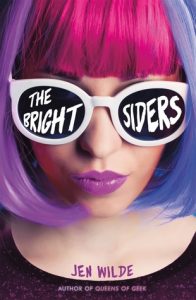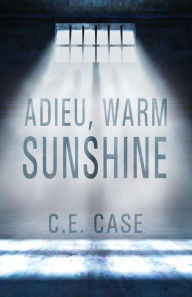Trigger Warnings: alcoholism, underage drinking, neglectful parenting, abusive relationship
Note: Not all trigger warnings are present in this review, but they are present in the book in question.
The Brightsiders has been on my to be read list for several months before I finally purchased a copy. The bright colors of the cover had really caught my eye, and turning it over to read the synopsis on the back had me practically buzzing to give it a read. The story of a bisexual teenager coming out to the world while also managing her place in the spotlight as the drummer in a teen punk band. At least, that’s what the back had me believe it was about.
Contrary to the blurb summary of the book, The Brightsiders is not about our main character, Emmy King, telling her family, friends, and thousands of fans about her sexuality. In fact, by all definitions she’s already out and proud. She has a bisexual pride flag hanging in her parents’ house and tabloids report on her relationship with another girl, Jessie, regularly.
Okay, so then what is the plot of the story if not coming out? I honestly couldn’t tell you. The first half of the book is setting up characters and making sure to tell (not show) us that this punk band, Brightsiders is just so amazing. Then nearly halfway through the book (HALF!) the author blindsides us with a romance between Emmy and another band member, Alife, the super cool genderqueer guitarist complete with sexy smirk and arms covered in ink. Emmy, and thus the book, suddenly has a fixation on all things sex that I didn’t appreciate. If the entire book had been written like that right out of the gate, it would have been less jarring.
As for writing style, this book felt clunky. There are several moments in this story where the writer will detach themselves from the plot so that they can go on long-winded lectures or tangents about homophobia, slut-shaming, or even a three-page rant about what bad kisses are like all while the main character is supposed to be experiencing the best kiss of her life. And while, yes, homophobia and bad kisses are both things that need to be corrected, these tangents feel like they would be more at home in a preachy social media post than in first-person fiction.
And then there were the characters; if you can even call them characters, I’d liken them a little closer to props. As early on as chapter two I had the feeling that all of the characters existed to stand behind Emmy and nod their heads. To tell her she never does anything wrong and to coddle her. Little did I know, it was worse than that.
Not that you would know it from the way this book is written, but there are in fact three members of the Brightsiders band, not two. Nearly every character other than Emmy is underdeveloped (more on that in a bit) but Ryan really gets the worst of it. Between Ryan, Emmy, and Alfie, Ryan has the least amount of focus on him and he even gets left out of a lot the story. He’s a tagalong to Emmy and Alfie’s story and he’s treated like a tagalong in the band too, despite being the frontman.
It’s not even worth mentioning any of the other people in this story because my biggest problem here is that the characters exist solely for representation and diversity points. These characters are given labels the second we meet them. “Asian. Bi.”, “Black. Nonbinary.” While inclusion is a wonderful thing, these labels aren’t what makes a person who they are. We the readers are not given the opportunity to properly know these characters because “white and queer” is treated as an accurate description of who someone is.
The parents are nothing more than comical villains. They are given no reason or motive to be such (poorly written) bad guys. Perhaps they were written this way to give Emmy a tragic backstory and make you feel bad for her. It doesn’t work. The conflict between the need to love her parents and be loved back and the recognition that they aren’t a healthy part of her life isn’t really shown here. They’re just bad guys meant to be hated and the author gives them no real substance.
As for Emmy herself, I don’t like her. She doesn’t have to fight for anything. Her sexuality has no repercussion on her relationships or her career. As great as the world would be if being anything other than heterosexual wouldn’t matter, it’s not realistic. And frankly, it’s offensive to all real-life LGBT+ musicians who have had to fight against discrimination and homophobia in the music industry to be heard. Very very few people will be able to love and relate to a character who doesn’t experience the same roadblocks in her life due to sexuality and gender identity as them. The author also tried to work in Emmy as an alcoholic and runs into this same issue. If you don’t know how addiction works, and you aren’t willing to put in even the most minimal amount of effort to research what it’s like, don’t do it. Emmy manages to achieve sobriety without really having to think about it or try. No struggle.
In conclusion, I’m sure there are several people who would enjoy The Brightsiders, but I am not one of them. The characters are flat cardboard cutouts of representation, the “bad guys” are poorly written so that Emmy can cancel them while everybody cheers, and the plot bounces around so much that I began to wonder why I was even reading it anymore. From the feel of this book, I’m sure the author had a blast writing it and was able to sort through their own thoughts by writing them out through the lens of the fabulously famous Emmy King, but the execution of this book was so poor, I wouldn’t recommend it.
Alice is a Texas dwelling college student with a passion for stories. She hopes to one day spread her love of literature as a middle school English teacher. Find her on Twitter, Instagram, and Pillowfort, or read more of her personal reviews on lilacchildwrites.wordpress.com



